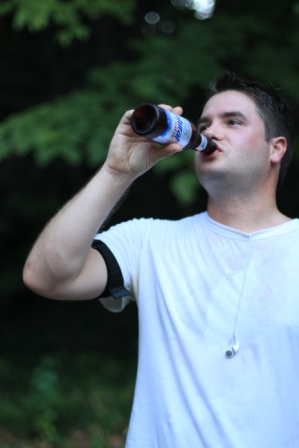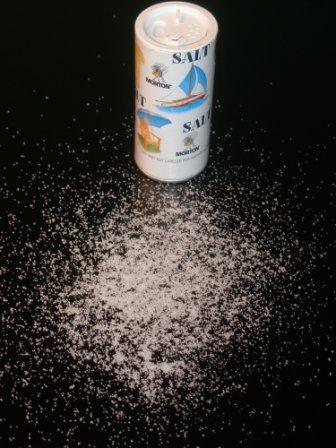Effects of Alcohol on Running
Saturday, April 4th, 2009I am currently conducting an experiment; the effects of abstaining from alcohol for at least 30 days. I am about 10 days into it now and I honestly haven’t felt much of a difference. The hypothesis which I was hoping would be correct is that I become more productive. I haven’t noticed my productivity per hour increase but I have been able to accomplish more in the time after social events. For instance, right now I’m up early in the morning writing this blog. Don’t you like me better when I’m “off the wagon”…or is it “on the wagon?”
Since this is a running blog, I want to explore further how my non-alcohol intake effects my running. I have always been a proponent of drinking a beer or two the night before a long distance race. I run so much I feel like I can not get enough carbohydrates by eating alone; unless I eat like six meals a day or something. Drinking is a fun way for me to intake a good bit of carbs without getting full. Plus it sounds cool when you are drinking to tell people you are going to run 10 miles the next day. It’s all about being cool isn’t it? I don’t even like the taste of alcohol, I just drink it because its cool to do. Doesn’t everyone?
No matter what I do to sound cool, even moderate amounts of alcohol 24 hours prior to a race will have an impact on your run. On the same token, not socializing and letting some steam out over a few drinks on a Friday or Saturday night can have negative effects on you too. It’s all about balance. The best thing is to do is be knowledgeable on what the alcohol you are intaking is doing to your body and your training. You don’t have to change your lifestyle to be a serious runner, just change your style. This will help you boss.
First and foremost, alcohol is a diuretic (it makes you urinate), which means it dehydrates you. If you are going out drinking and need to run the next day then try to drink a water for every beer you drink. Do not exceed one glass of water per alcoholic beverage. The more liquids you intake the more you will push them through your body. Try drinking a couple of glasses of water at the end of the night so your body hold on to it a little longer.
Alcohol also depletes your electrolytes (potassium and sodium). So you need to replace those nutrients. Before going to bed drink some orange juice for potassium and Gatorade for sodium. Better yet, have a virgin bloody mary just before bed. With extra salt!
Also be aware that if you drink alcohol 24 hours before running your body has trouble regulating its temperature. If it is cold out, your body will lose heat quicker. If it is hot out, your body will not cool itself off quick enough. Sorry, you lose either way. Plus your body will sweat more than normal to try to cool itself down. Yes, I agree it is good to sweat out the toxins but when your sweat smells like a bar its probably better to just go back to bed. You’re not helping anyone.
Even though it may be 12 hours after you had your last drink of alcohol, your balance and coordination will still be off. Don’t push yourself. You did that last night with your 83 second keg stand. Great job. What an accomplishment. You can keep running hung-over, just slow it down a bit. You handle things better at a slow pace anyways. Would you like me to type slower so you can understand Mr. Hung-Over Every Saturday Morning Guy? Why do you have 3 middle names anyways?
Alcohol wrecks your sleep patterns. I know, you sleep better after you’ve been drinking. That’s not true. Your body tosses and turns all night. Wait until your honeymoon night when you share a bed with someone else for the first time ever. Your brand new significant other will tell you, you’ve got the jimmy legs. I’m also assuming here that you’ll be wasted on your honeymoon night. Who gets married sober anyways? As far as running a race, I’ve always felt it was the night before the night before’s sleep is what mattered the most. Or maybe that was just something we said in high school cross-country so we could stay up late on overnight trips.
Lastly, drinking alcohol and running can lead to making some very bad decisions like sprinting 3 miles home from the bar, carbo loading at 3 in the morning at Taco Bell, or even streaking. Come on. We’re going through the quad! To the gymnasium! Just get in the car Frank.
So don’t give up drinking. Give up drinking 48 hours before race day. Also, give up on being a jackass. Drink in moderation. Understand the effects it will have on your work-out and try to mitigate them as much as possible. Nobody is perfect, it’s how you manage your imperfections that sets you apart.



 As it gets warmer outside it is time to start focusing on your hydration levels. I’m really into
As it gets warmer outside it is time to start focusing on your hydration levels. I’m really into